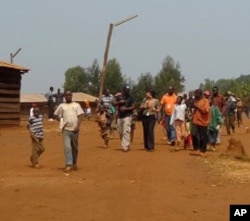Around the world, the UN's World Food Program, or WFP, provides food to about 90 million people per year, almost two thirds of whom are children. Working in 73 countries this year, the WFP plans to provide about 3.7 million tons of food to those unable to produce or obtain enough food for themselves and their families.
In his hometown in the South Kivu province of the Democratic Republic of the Congo, Mateso Kibinda was heading to work in the fields one morning when he saw several of his neighbors in front of him. They started running after him with machetes. When they caught him, they chopped off his arm. Kibinda says the attackers were jealous of his father's wealth.
He and his wife fled with their children to neighboring Burundi. That was in 1997.
He says his neighbors are still there. They haven't yet moved or gone anywhere. They are there and they are waiting for him. He says if he returns to his country, they will kill him.
Today, Kibinda and his family live in the Gasorwe refugee camp in northern Burundi, home to about 10,000 refugees. The vast majority of the 2,000 families living here are from the same war-torn region of the Congo.
Each month, the World Food Program in Burundi provides each refugee with a supply of food: a mix of cereals, beans, corn soya, oil and salt.
Kibinda says the food is not enough.
Kibinda says the food is too little. "Because I'm a refugee," he says, "I don't have anywhere to go for more food. I live here and I don't have any other choice."
32-year-old Kibinda didn't have a job before he came to Burundi and like the other refugees, isn't allowed to work in the refugee camp.
"I don't have any work in the camp," he says. "I'm staying here just because I don't have any place to go and I don't have any abilities to go in another country."
Very little to do
Human Rights Watch reports that refugees are often frustrated by their long-term refugee status and unemployment, leading to high rates of alcoholism, anxiety and depression.
Some male refugees sell part of their food rations to buy locally-produced alcohol. The drinking does, on occasion, lead to domestic abuse of female refugees. With WFP support, the UN's Refugee Agency recently started an outreach program to identify those being abused and protect them. They're also working to find the source of alcohol and shut it down.
The WFP says such a situation is a "recurring theme" in refugee camps where refugees typically have little to do.
War rages on
Like many residents in the camp, Kibinda's wife, Tabou Muamini, is frustrated with her life in limbo.
"The conditions are quite miserable," Muamini says. She says they have to sleep on the floor at night, and during the rainy season, everything is wet.
She said she wished WFP would provide non-food items like shoes, a mat to sleep on, or some clothing for their children.
Like her husband, she doesn't know if or when they will return to their homeland.
She says in the Congo there is a war and the war hasn't finished so they can't return yet. "I will stay here until the war is finished," she says.
Support needed for the youth
So, like the other 20,000 refugees from the Congo living in four refugee camps throughout Burundi, they wait.
And the WFP continues to provide food assistance, nearly 30,000 metric tons last year.
But Mitchell Sendheyabura echoes refugees' complaints that the food allotted for each person at the refugee camps is not enough. The 54-year-old representative of Burundi's National Office for Protection of Refugees and Stateless People says they simply need larger amounts.
He says the amount of food that they receive is not sufficient. All it does is basically help them sustain adults, he says, but they need to support the growth of the children and this is not enough. Some of them are malnourished and need more.
Refugee Concan Gadenato agrees: more food would be better. But, as the refugee representative for the Gasorwe camp, he also wants more variety.
He says they would like a source of protein like sardines and corn beef. "The other thing that we are missing is sugar, he says, "because we add that to the wheat."
Marc Neilson, WFP Burundi's public information officer, says he understands the refugees' concerns but believes the food is "adequate." Each refugee receives a daily ration that WFP says meets nutritional needs. Each person gets 2,100 kilo calories of energy a day, plus a set amount of fat and protein.
Neilson noted that the organization is 100 percent donor funded and that with more money, they can do more to help people in need.
"In the case of Burundi, when you have the majority of the nation who is at risk for under nutrition at any given time and an estimated 40 percent of children who are suffering from some form of malnutrition, there is a lot more we can do. And it all depends on how many resources we have to use for that.
In August, the Belgian government announced it would donate a million euros to WFP's Burundi program.
